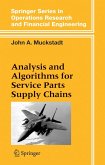The objective of ONLINE OPTIMIZATION is to provide a systematic survey of the methodology. From the methodological survey, the book then covers a variety of applications of online optimization methods in the domain of Operations Research and Management Science. These applications include a range of problem types, which include the multiple scheduling complex transportation systems, optimizing financial decision problems in "real time", and complex production problems of all sorts (e.g., whether costs should be reduced or profits should be maximized or scarce resources should be used wisely, etc.). With online optimization the issue of incomplete data is an essential aspect of the scientific challenge. Hence, how well online algorithms can perform and how one can guarantee solution quality-even without knowing all data in advance-are the primary challenges of the online optimization methodology.
Bitte wählen Sie Ihr Anliegen aus.
Rechnungen
Retourenschein anfordern
Bestellstatus
Storno








